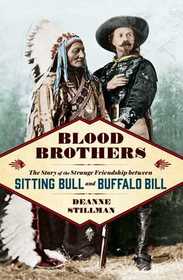This is certainly an interesting book about Sitting Bull and Buffalo Bill, but there are other important characters in it too, on which the author spends considerable time. Two of these other characters are Annie Oakley and George Custer. In fact, these two occupy a lot of space in the book. The author jumps around a lot, not just in time, but in veering off to devote many pages describing some of the other, less important, characters.
The DJ says "...the Lakota wiped out Custer and his Seventh Cavalry." Of course, that isn't true, but a large part of the 7th was killed, due to Custer's stupidity. If Major Reno hadn't left the valley floor and retreated to the heights, the DJ would be correct. What isn't in the book is that when the 7th was rebuilt, the enlisted men petitioned the War Department to make Reno the new commander. But the disaster needed a villain, and the Army and Mrs. Custer had decided on Reno to play that role. I wonder if Mrs Custer was aware her husband was the father of a child by an Indian maiden?
The book repeats the old falsehood that Custer was the commanding officer of the 7th, when he was just the second command. In fact, he was still facing a court martial on charges of "misconduct" when this campaign took place. Also not in the book was mention of Custer's popularity, the Indians called him "Squaw Killer," and his own men's nickname for him was "Hard Ass." If Custer hadn't been killed at the Little Big Horn, most people today wouldn't have the faintest idea who he was. But the book correctly lists the country's impression that Sitting Bull "killed" Custer, when the war leader was actually Crazy Horse.
Despite the numerous jumps back and forth in time throughout the book, I was able to enjoy the narrative. I was a bit disheartened to learn Buffalo Bill regularly cheated on his wife, and that he ended up a bankrupt drunk. Although, he claimed later in life to have found God and sobriety. And all through the book we are reminded of the raw deal our government gave the Indians. Which is good, as that is real history we need to know. However, the book relates that even during the last part of the 19th century many Americans and some organizations were very actively working for the benefit of the Indians.
It's Annie Oakley and her husband Frank who come across as real heroes. When she died in her late sixties, her husband died three weeks later of a broken heart.
The DJ says "...the Lakota wiped out Custer and his Seventh Cavalry." Of course, that isn't true, but a large part of the 7th was killed, due to Custer's stupidity. If Major Reno hadn't left the valley floor and retreated to the heights, the DJ would be correct. What isn't in the book is that when the 7th was rebuilt, the enlisted men petitioned the War Department to make Reno the new commander. But the disaster needed a villain, and the Army and Mrs. Custer had decided on Reno to play that role. I wonder if Mrs Custer was aware her husband was the father of a child by an Indian maiden?
The book repeats the old falsehood that Custer was the commanding officer of the 7th, when he was just the second command. In fact, he was still facing a court martial on charges of "misconduct" when this campaign took place. Also not in the book was mention of Custer's popularity, the Indians called him "Squaw Killer," and his own men's nickname for him was "Hard Ass." If Custer hadn't been killed at the Little Big Horn, most people today wouldn't have the faintest idea who he was. But the book correctly lists the country's impression that Sitting Bull "killed" Custer, when the war leader was actually Crazy Horse.
Despite the numerous jumps back and forth in time throughout the book, I was able to enjoy the narrative. I was a bit disheartened to learn Buffalo Bill regularly cheated on his wife, and that he ended up a bankrupt drunk. Although, he claimed later in life to have found God and sobriety. And all through the book we are reminded of the raw deal our government gave the Indians. Which is good, as that is real history we need to know. However, the book relates that even during the last part of the 19th century many Americans and some organizations were very actively working for the benefit of the Indians.
It's Annie Oakley and her husband Frank who come across as real heroes. When she died in her late sixties, her husband died three weeks later of a broken heart.




